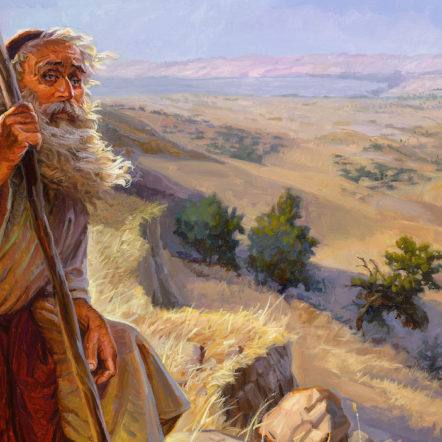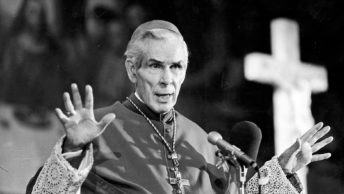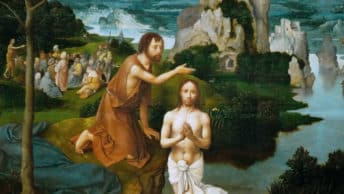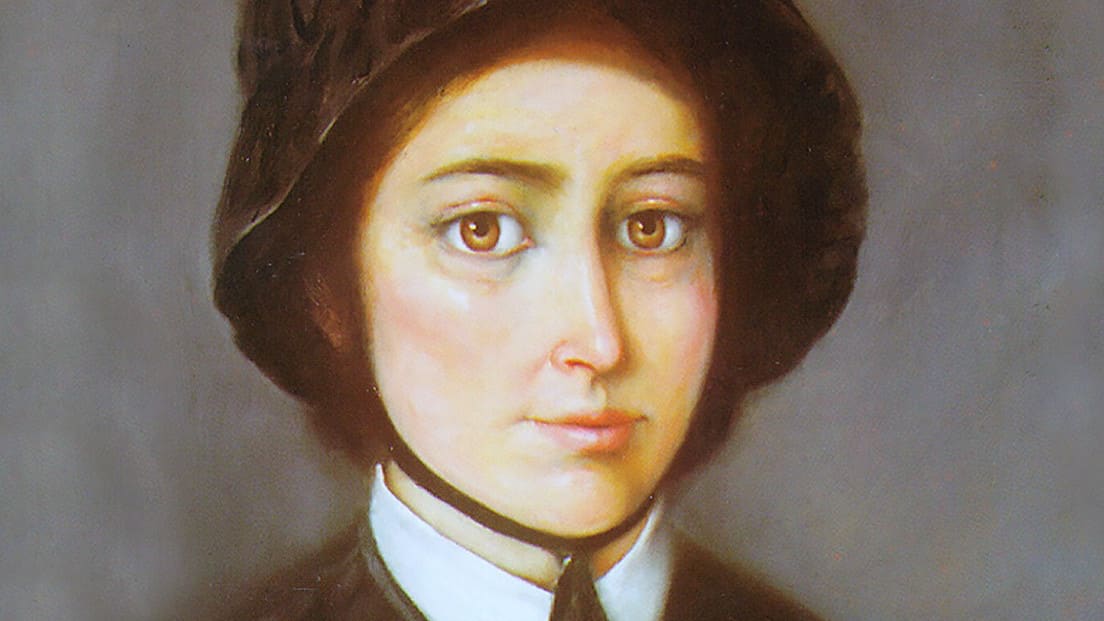Once there was a young priest—we’ll call him Fr. Brian—who was appointed pastor of a big parish, even though he had been ordained just a few years. The prospect of being in charge of a large staff and serving as spiritual leader of almost 2000 families filled him with anxiety, and he was worried he wouldn’t know what to do and wouldn’t measure up. He went to see his spiritual director, a wise older priest whom we’ll call Fr. Leo. When he explained his concerns, Fr. Leo responded, “So, you’re worried about taking up the mantle of leadership—so let’s talk about that. First of all, what is a mantle?” Fr. Brian said, “I think it was some sort of cloak or garment, signifying authority.” “That’s right,” Fr. Leo responded. “When Moses was about to die, he ascended Mt. Nebo where he laid hands on his disciple Joshua and gave him his mantle, thereby handing on his authority. When the prophet Elijah was about to be taken up in a fiery chariot at the end of his ministry, he dropped his mantle so that his disciple Elisha could pick it up and become God’s prophet and the spiritual leader of the people. Do you see the pattern here?”
When Fr. Brian nodded, Fr. Leo continued, “Now, what happened at the end of Jesus’ ministry on earth? He went up a mountain, as did Moses, and He ascended to Heaven, as Elijah did, and His disciples were with Him—but where’s His mantle? Every other element of the pattern is there—so on whom did the mantle fall?” Fr. Brian thought for a moment, then answered, “Scripture doesn’t mention it; the mantle of Jesus appears to be missing.” Fr. Leo smiled and said, “The answer is that the mantle of Jesus is too big to fall on just one person. Yes, Peter was the leader of the apostles, and our first Pope, but he didn’t make all the decisions or do everything himself; the other apostles helped him. The apostles didn’t minister all alone; they created deacons to help them. The early Christians didn’t expect their leaders to do all the evangelizing; they played their role in spreading the Gospel. Now, how many persons were in the upper room on the day of Pentecost?” Fr. Brian answered, “Well, the Acts of the Apostles (1:15) says that when Peter proposed choosing someone to replace Judas, there were 120 followers of Jesus there—so I assume most if not all of them were present on Pentecost.” “Yes,” said Fr. Leo, “and they each received the Holy Spirit. In effect, the mantle of Jesus fell upon all of them, commissioning every one of them to carry on the Master’s work, instead of leaving it entirely up to Peter and his companions. Do you see the point I’m making?”
Fr. Brian thought a moment, and responded, “I think so. You’re saying that it’s not all up to me; everyone in the parish is supposed to help.” “Exactly,” Fr. Leo said. “Every member of your new parish who has been baptized and confirmed is called by God to help build up the Body of Christ in your parish, and also help spread the Gospel in that larger community—and it’s your job to allow and encourage this to happen, without trying to do and control everything yourself. Now go, and let the Holy Spirit be in charge” (adapted from The Book of Mysteries, Jonathan Cahn, p. 57). This story is a timely reminder for us today. The Church is facing many challenges, and overcoming them isn’t just the job of the Pope, the bishops, and the clergy; each one of us has a role to play, a share in the mission of Jesus—and we will one day be judged on how we respond.
After His glorious resurrection on Easter Sunday, Jesus taught the apostles many things not recorded in the Bible; as the Acts of the Apostles (1:1-11) says, “He presented Himself alive to them by many proofs after He had suffered, appearing to them during forty days and speaking to them about the Kingdom of God.” In effect, Our Lord was giving His disciples their marching orders, for He said in the Gospel that they were to be His witnesses and preach, in His Name, repentance for the forgiveness of sins to all the nations, beginning in Jerusalem. Then He blessed them and was taken up from their sight. What’s interesting is that, as the apostles were staring upwards in wonder and uncertainty, two angels suddenly stood beside them and said, “Why are you standing there looking up at the sky?”—in other words, “Don’t just stand there; get busy.”
A similar word of correction and encouragement might be given to many Catholics today. Our guardian angels might tell us, “Don’t just stand there being discouraged by the problems of your world and the suffering of innocent people; use the opportunities you’re given to make a difference. Pray for the Holy Spirit’s guidance, and then in a spirit of humility and trust, act upon the inspiration you receive.”
In the Archdiocese of Detroit, for example, the growing shortage of priests is expected to worsen in the next ten years. Anyone who thinks, “Well, that’s too bad, but it’s not my problem; let Archbishop Vigneron and the archdiocesan officials figure it out, or let the priests themselves recruit more seminarians,” just doesn’t understand and isn’t listening to or obeying the Holy Spirit. All of us are in some way called to respond to this crisis—perhaps by asking young men if they’ve considered this vocation and encouraging them to think about it, possibly by joining the Serra Club or other groups promoting vocations, and certainly by taking part in the Year of Prayer for Priestly Vocations the Archbishop has announced. Prayer is powerful, and is entirely capable of changing things and drawing down heavenly blessings—so if there are serious problems in the Church, and there are, it means we as Catholics haven’t been praying as much and as fervently as we need to.
Whether the issue is a shortage of vocations, a failure on the part of many Catholics to believe in the Real Presence of Jesus in the Eucharist, the alienation and disunity found in many families, society’s growing hostility to the message of the Gospel, a decline in our nation’s moral standards, the rising influence of the culture of death, the persecution of Christians around the world and even here in the United States, or anything else, the solution has to involve all of us, united in faith and prayer, and committed to putting Jesus first in our hearts and our lives. Weak and indifferent Catholics lead to a sinful and dysfunctional society; strong and Spirit-filled Catholics lead to a growing Church and a healthy and renewed country. We’re given an opportunity to make a difference, but we won’t succeed if we expect someone else to do our part. Jesus is calling each one of us personally—and everything depends on whether we choose to hear and answer His call.








